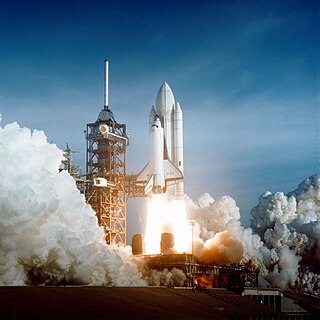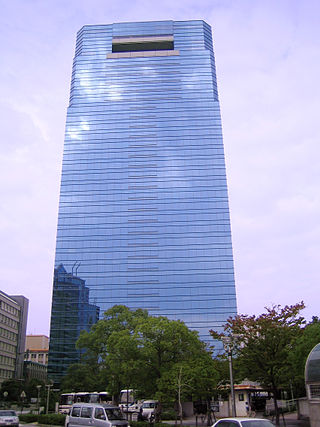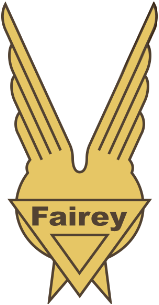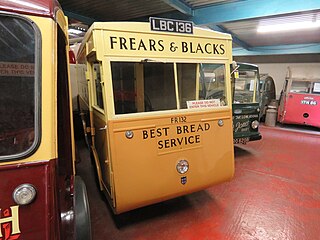
A solid-propellant rocket or solid rocket is a rocket with a rocket engine that uses solid propellants (fuel/oxidizer). The earliest rockets were solid-fuel rockets powered by gunpowder; they were used in warfare by the Chinese, Persians, Mongols, and Indians as early as the 13th century.

Kawasaki Heavy Industries Ltd. (KHI) is a Japanese public multinational corporation manufacturer of motorcycles, engines, heavy equipment, aerospace and defense equipment, rolling stock and ships, headquartered in Chūō, Kobe and Minato, Tokyo, Japan. It is also active in the production of industrial robots, gas turbines, pumps, boilers and other industrial products. The company is named after its founder, Shōzō Kawasaki. KHI is known as one of the three major heavy industrial manufacturers of Japan, alongside Mitsubishi Heavy Industries and IHI. Prior to the Second World War, KHI was part of the Kobe Kawasaki zaibatsu, which included Kawasaki Steel and Kawasaki Kisen. After the conflict, KHI became part of the DKB Group (keiretsu).

The Bristol Aeroplane Company, originally the British and Colonial Aeroplane Company, was both one of the first and one of the most important British aviation companies, designing and manufacturing both airframes and aircraft engines. Notable aircraft produced by the company include the 'Boxkite', the Bristol Fighter, the Bulldog, the Blenheim, the Beaufighter, and the Britannia, and much of the preliminary work which led to Concorde was carried out by the company. In 1956 its major operations were split into Bristol Aircraft and Bristol Aero Engines. In 1959, Bristol Aircraft merged with several major British aircraft companies to form the British Aircraft Corporation (BAC) and Bristol Aero Engines merged with Armstrong Siddeley to form Bristol Siddeley.

North American Aviation (NAA) was a major American aerospace manufacturer that designed and built several notable aircraft and spacecraft. Its products included: the T-6 Texan trainer, the P-51 Mustang fighter, the B-25 Mitchell bomber, the F-86 Sabre jet fighter, the X-15 rocket plane, the XB-70, the B-1 Lancer, the Apollo command and service module, the second stage of the Saturn V rocket, and the Space Shuttle orbiter.

Baltzar von Platen was a Swedish engineer and inventor.

The Westinghouse Electric Corporation was an American manufacturing company founded in 1886 by George Westinghouse. It was originally named "Westinghouse Electric & Manufacturing Company" and was renamed "Westinghouse Electric Corporation" in 1945. The company acquired the CBS television network in 1995 and was renamed "CBS Corporation" until being acquired by Viacom in 1999, a merger completed in April 2000. The CBS Corporation name was later reused for one of the two companies resulting from the split of Viacom in 2005.

Rocketdyne was an American rocket engine design and production company headquartered in Canoga Park, in the western San Fernando Valley of suburban Los Angeles, in southern California.

The Fairey Aviation Company Limited was a British aircraft manufacturer of the first half of the 20th century based in Hayes in Middlesex and Heaton Chapel and RAF Ringway in Cheshire that designed important military aircraft, including the Fairey III family, the Swordfish, Firefly, and Gannet. It had a strong presence in the supply of naval aircraft, and also built bombers for the RAF.

Volvo Aero was a Swedish aircraft, guided missiles and rocket engine manufacturer. It became GKN Aerospace Engine Systems following the company's acquisition by British engineering conglomerate GKN during 2012.

A refrigerator, colloquially fridge, is a commercial and home appliance consisting of a thermally insulated compartment and a heat pump that transfers heat from its inside to its external environment so that its inside is cooled to a temperature below the room temperature. Refrigeration is an essential food storage technique around the world. The lower temperature lowers the reproduction rate of bacteria, so the refrigerator reduces the rate of spoilage. A refrigerator maintains a temperature a few degrees above the freezing point of water. The optimal temperature range for perishable food storage is 3 to 5 °C. A similar device that maintains a temperature below the freezing point of water is called a freezer. The refrigerator replaced the icebox, which had been a common household appliance for almost a century and a half. The United States Food and Drug Administration recommends that the refrigerator be kept at or below 4 °C (40 °F) and that the freezer be regulated at −18 °C (0 °F).
Kelvinator was an American home appliance manufacturer and a line of domestic refrigerators that was the namesake of the company. Although as a company it is now defunct, the name still exists as a brand name owned by Electrolux AB. It takes its name from William Thomson, 1st Baron Kelvin, who developed the concept of absolute zero and for whom the Kelvin temperature scale is named. The name was thought appropriate for a company that manufactured ice-boxes and refrigerators.

The Ganz Machinery Works Holding is a Hungarian holding company. Its products are related to rail transport, power generation, and water supply, among other industries.
Thiokol was an American corporation concerned initially with rubber and related chemicals, and later with rocket and missile propulsion systems. Its name is a portmanteau of the Greek words for sulfur and glue, an allusion to the company's initial product, Thiokol polymer.
Metropolitan-Vickers, Metrovick, or Metrovicks, was a British heavy electrical engineering company of the early-to-mid 20th century formerly known as British Westinghouse. Highly diversified, it was particularly well known for its industrial electrical equipment such as generators, steam turbines, switchgear, transformers, electronics and railway traction equipment. Metrovick holds a place in history as the builders of the first commercial transistor computer, the Metrovick 950, and the first British axial-flow jet engine, the Metropolitan-Vickers F.2. Its factory in Trafford Park, Manchester, was for most of the 20th century one of the biggest and most important heavy engineering facilities in Britain and the world.
Dick, Kerr and Company was a locomotive and tramcar manufacturer based in Kilmarnock, Scotland and Preston, England.

Project Hermes was a missile research program run by the Ordnance Corps of the United States Army from November 15, 1944, to December 31, 1954, in response to Germany's rocket attacks in Europe during World War II. The program was to determine the missile needs of army field forces. A research and development partnership between the Ordnance Corps and General Electric started November 20, 1944 and resulted in the "development of long-range missiles that could be used against both ground targets and high-altitude aircraft."
The Refrigerator Bowl was an American college football bowl game played annually from 1948 until 1956 in Evansville, Indiana.

de Havilland Propellers was established in 1935, as a division of the de Havilland Aircraft company when that company acquired a licence from the Hamilton Standard company of America for the manufacture of variable-pitch propellers at a cost of about £20,000. Licence negotiations were completed in June 1934.

A. O. Smith Corporation is an American manufacturer of both residential and commercial water heaters and boilers and the largest manufacturer and marketer of water heaters in North America. It also supplies water treatment products in the Asian market. The company has 24 locations worldwide, including five manufacturing facilities in North America, as well as plants in Bengaluru in India, Nanjing in China and Veldhoven in The Netherlands.

Partridge Wilson Engineering was a company established in Leicester, England in 1926. It initially made radios, and then battery chargers. In 1934 it began to build battery electric road vehicles, producing both cars and milk floats, which were marketed under the Wilson Electric marque. Vehicle production ceased in 1954, but it continued to make chargers and rectifiers. In 1974, it became part of Westinghouse Davenset Rectifiers Ltd, owned by Westinghouse Brake & Signal Company and in 1986 the Leicester site was closed, with manufacturing transferring to Chippenham. At least one of the commercial vehicles and three of the cars have been preserved.















